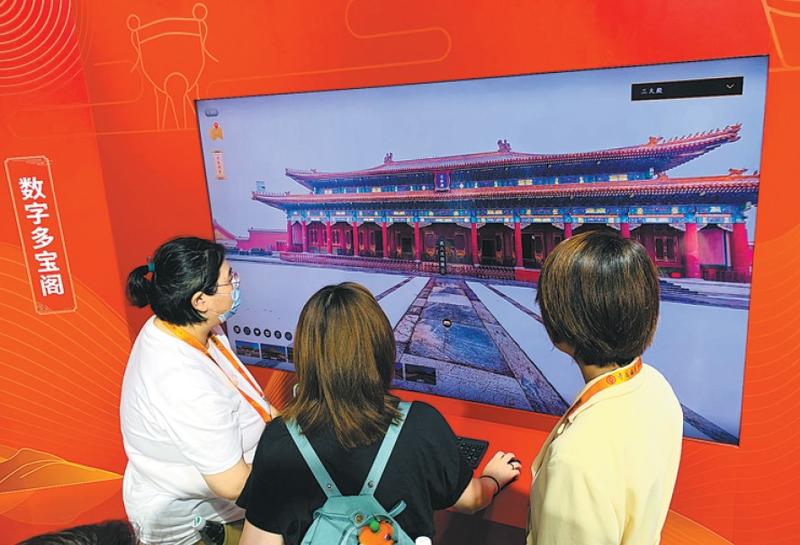 Digital technologies help visitors learn about the Palace Museum at the 2021 CIFTIS. (LIANG KAIYAN / CHINA DAILY)
Digital technologies help visitors learn about the Palace Museum at the 2021 CIFTIS. (LIANG KAIYAN / CHINA DAILY)
Experts called for enhanced international cooperation to explore a path toward recovery and revitalization in global tourism during the ongoing China International Fair for Trade in Services.
The 2021 WFTC Beijing Xiangshan Tourism Summit and World Conference on Tourism Cooperation and Development held at the China National Convention Center on Friday is the only summit to which an international group-the World Tourism Cities Federation-played host during this year's CIFTIS.
The event conveyed a key message to the world-the global tourism community is revitalizing their confidence-and it signaled the industry is in preparation for a restart, which capitalizes on its potential to become a pillar to support cities' inclusiveness and sustainable development, Zurab Pololikashvili, secretary-general of the United Nations World Tourism Organization, said in a video speech.
Since early 2020, the COVID-19 outbreak has brought about unprecedented challenges to global tourism. However, with the progress in vaccination worldwide, many countries have reopened their doors, tourism professionals are returning to their posts and tourists' confidence is being restored, he said, citing China as an example.
The pandemic is encouraging people to rethink what role tourism will play in cities' future development, he added.
Vladimir Norov, secretary-general of the Shanghai Cooperation Organization, addressed the conference via video link and said that while the pandemic is presenting huge challenges, it is also creating new opportunities.
Data from the UNWTO show that in 2020, global tourism saw a reduction of 1.03 billion visits and lost US$1.3 trillion in income year-on-year, with 120 million people working in the industry encountering difficulties.
Noncontact services based on information telecommunications technologies, such as virtual tourism and online exhibitions, have slashed operational costs and improved service quality and the industry's capacities for responding to emergencies. That is conducive to creating a new high-quality tourism environment, he said.
Hu Heping, minister of culture and tourism, said that since the pandemic outbreak, the ministry has implemented strict prevention and control measures against risks, and launched a series of policies, including those benefiting the entire industry or targeting vulnerable businesses, to help market entities reduce loss and weather the difficult time.
Government data shows there were 1.87 billion domestic visits in the first half of 2021, a surge of 100.8 percent from the same period last year, and 1.63 trillion yuan (US$252.32 billion) generated in revenue during the period, up 157.9 percent.
Beijing Mayor Chen Jining told the conference that innovations in the industry have proposed new development directions.
The widespread applications of intelligent technologies, such the combination of 5G with artificial intelligence and virtual reality, have spurred the flourishing growth in virtual tourism. Smaller-group, low-density, high-quality leisure tourism products focused on eco-friendly environment, healthcare services and cultural experiences are becoming new growth spots, he said.
From January to June, Beijing received 130 million visits and earned 186.9 billion yuan in tourism revenue, both registering an increase of 1.3 times.
In February next year, Beijing will host the 2022 Olympic and Paralympic Winter Games, providing new opportunities for international tourism cooperation, Chen said.
He called on enhanced collaboration for fighting the pandemic, sharing experiences and providing more incentives to help businesses recover. He also proposed improving intelligent tourism management, innovating tourism service models and promoting intelligent transformation.


